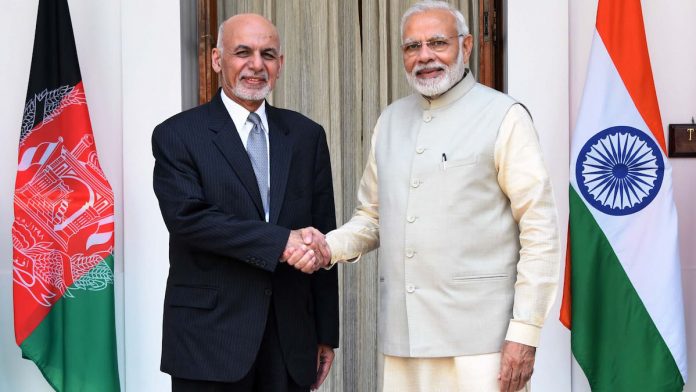The winds of the Hindu Kush are astir once again with the premeditated actions of a variety of actors from a variety of nationalities attempting to end the strife and bring peace back to Afghanistan.
The main action is taking place in Doha, Qatar, where talks between the Afghan government delegation and the Taliban have been stalled for 22 days since they were launched with much fanfare on 12 September. The two sides haven’t even begun direct talks with each other. They can’t even seem to agree on a common agenda – will an Islamic Republic of Afghanistan mean that all its citizens will be equal, or will some be more equal than others?
In fact, these past few hours and days, the action has shifted out of Kabul – besides Doha, to Islamabad, Delhi and the Tajik capital, Dushanbe.
On Monday afternoon, Afghanistan President Ashraf Ghani landed in Doha with a high-powered delegation that includes first vice-president Amrullah Saleh, acting foreign minister Hanif Atmar and national security advisor Hamdullah Mohib.
But officials said Ghani would not talk to the Taliban directly because of the recent string of terror attacks across Afghanistan. In Nangarhar Saturday, a car bomb blast killed 16 people. In Laghman province Monday, hours before Ghani’s plane landed in Doha, the governor survived a suicide attack, but eight people were killed.
Today, Afghanistan’s chairman of the High Council for National Reconciliation Abdullah Abdullah is arriving in Delhi. He is expected to brief the Indian leadership on the Doha talks, tell Delhi to continue with its patient support of peace in Afghanistan and to explain that the Taliban may have been anathema so far, but they now need to be dealt with.
Basically, Abdullah would like India to be a little more enthusiastic about the ongoing Doha negotiations, not take the hands-off attitude it has taken so far but not do anything to upset it either.
Kabul would like India to continue to behave like the strong, silent type it has been these past so many years – not upset the apple cart, especially with Pakistan once again looming large on the horizon. Continue to help out with project aid, like building dams and schools – but at least in the short run, keep a low profile.
Pakistan matters
Significantly, Abdullah was in Islamabad last week to meet Pakistan Army chief Gen. Qamar Javed Bajwa, Prime Minister Imran Khan and others – perhaps his most important port of call in recent weeks. Certainly, this was an attempt to persuade the Pakistani government to intervene in a positive way in the stalled Afghan peace process in Doha.
Abdullah knows, as do Ghani and the rest of Afghanistan, that if the Taliban is back to the negotiating table after so many years, it is the Pakistanis who have nudged them. That Pakistan holds all the major cards.
Certainly, the realisation that Afghanistan is caught between a huge boulder and a hard place is terribly difficult to swallow. Who wants to be told, after 19 years of fighting the Taliban, that you may soon have no option but to have them sit on the throne of Kabul? That your election may really be worth a piece of straw? That another country – Pakistan – has its finger on both war and peace?
And yet the Afghans are braver than most. They won’t give up. Hours before he left for Kuwait and Doha, Ghani told a crowd in Paktika province that the Taliban should provide a plan for peace, not slogans. NSA Hamdullah Mohib told a Pashto TV anchor: “We have made promises to the people…If Pakistan bombs our soil, we will respond to it. We won’t break our promise.” And foreign minister Hanif Atmar told a gathering of ambassadors in Kabul that the Taliban had failed to adhere to their commitments to stop the violence despite thousands of Taliban prisoners released in exchange.
Taliban’s demands
So, why are the talks stalled in Doha? According to Tolo News, both sides are in agreement on 18 out of 20 points, but the two that remain are fundamental to the nature of the future state. Namely, what is the foundational religious jurisprudence for the talks, and therefore of the Afghan state? And, will the US-Taliban deal signed in February this year be the “overarching authority” under which the peace negotiations can take place?
It seems that the Taliban want the Hanafi school of Islam to be the only religious guidelines. Tolo News reports the Afghan government team has conceded to this, but wants Shia personal law as well as the laws of other religious minorities to be respected as well.
As for the Taliban also insisting on its deal with the US to act as the mother agreement for talks, the Afghan government team has suggested a variety of alternative options, including a “loya jirga”, or a gathering of elected Afghans and civil society.
Delhi understands the message
Certainly, the Doha talks need to get back to the table, sooner than later. A resolution to the strife in Afghanistan is the most important story for the next few years, especially because it impacts India in so many ways. Abdullah’s message to Prime Minister Narendra Modi to have India lie low for the moment, while Pakistan and the US brave the limelight, is sure to be understood in the right spirit.
As Deng Xiaoping said, hide your light and bide your time – a piece of Chinese advice New Delhi would gladly keep close to its heart at this moment. Certainly, Pakistan, which holds the aces in a future role for the Taliban, will not want Delhi to rear its head. For the same reasons, perhaps the US, with which India has a great and burgeoning relationship, will want Delhi to stay down.
Abdullah doesn’t need to spell it out to PM Modi – he understands. Nor does Abdullah need to tell the PM that Kabul and Delhi will continue with their special relationship, even if it’s behind the purdah.
Abdullah’s visit to Delhi is a small turn in the wheels of history. But it signifies the consolidation of an old bond that is special, and at the risk of a cliché, can only grow from strength to strength.













